The women protesting in the Argentina abortion debate
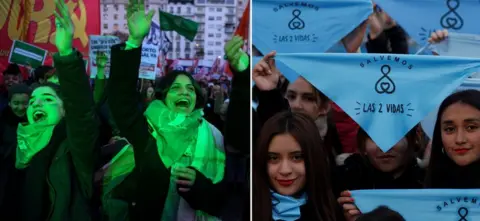 BBC
BBCThe Senate in Argentina is debating a controversial bill to expand abortion rights.
The proposal, which would allow women to legally terminate a pregnancy in the first 14 weeks, passed the lower house by a narrow margin in mid-June, after a feverish 22-hour session.
The bill would make Argentina the third Latin American country to broadly legalise abortion, after Cuba and Uruguay.
The vote is anticipated to be tight in the conservative 72-member Senate.
It has polarised debate at home and on the streets. Over the past few months, groups both in favour of the bill and against have demonstrated in front of the Congress building in Buenos Aires, and in other cities across the country.
These are some of the prominent activists who have been making their thoughts known:
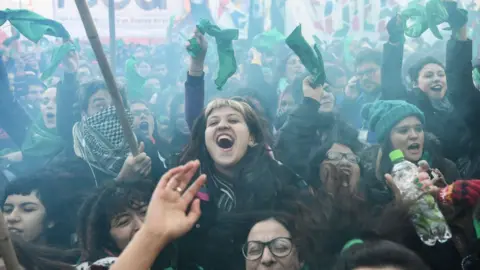 Getty Images
Getty ImagesGreen bandanas
Ingrid Beck is a journalist, writer and organiser of the Ni Una Menos collective.
As an activist, I felt I needed to put my body out there to support the expansion of abortion rights.
This debate has brought to the fore a new political player: the women's movements who are now occupying the public space. These movements grew out of the Ni Una Menos (Not One Less) marches against gender violence that started in 2015, and haven't stopped growing since.
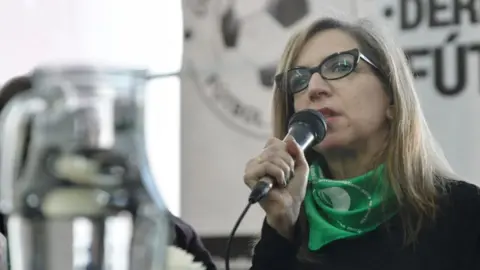 Nadia Petrizzo
Nadia PetrizzoWe recently got almost a million people out on the streets for one of our demonstrations, which proves that the feminist movement is currently one of the strongest political forces, with a striking power to bring people together.
It is also horizontal, with no hierarchy or leaders. This makes it hard for the political establishment to wrestle with. The Argentine government recognised this and channelled our requests through Congress - the way it should be.
I don't think we needed a referendum - like the one through which Ireland overturned the country's abortion ban - for a number of reasons.
Firstly, because abortion has been legal in Argentina since the 1920s [in cases of rape or when the mother's life is at risk] and we are simply pushing to expand this right to all women.
Secondly, because this is a matter of public health that is better decided by lawmakers.
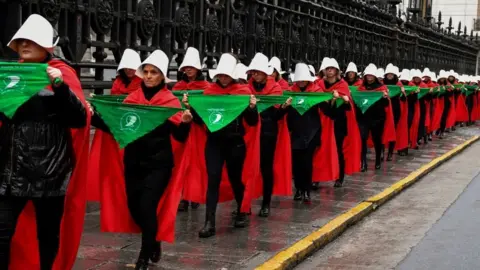 Getty Images
Getty ImagesWe chose the green bandana as an emblem because bandanas are already linked to social activism in Argentina, being the symbol of the Mothers and Grandmothers of Plaza de Mayo [who fought for their disappeared relatives during the 1970s dictatorship].
At first we were intimidated to wear it because it made us an easy target for verbal abuse. But now it has become a sign of sorority: we look at each other on the streets and feel we are fighting the same fight.
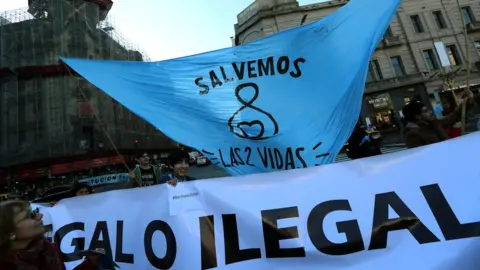 Getty Images
Getty Images'We learnt how to protest'
Camila Duro, 24, is a member of the non-religious, non-partisan anti-abortion NGO Frente Joven.
The message that we wanted to put across is that abortion equals social failure. For a woman to resort to it, many other things need to have failed first.
Secondly, we believe that abortion-related maternal mortality can be lowered through other means, such as a range of public health initiatives to take care of the mother - and not through legalising abortion.
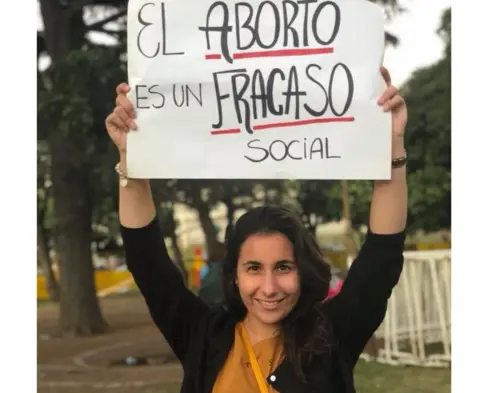 Camila Duro
Camila DuroAnd we say that is never a good idea to end a life in order to solve other problems; that's like sticking a plaster over a bleeding wound. We say "let's defend both lives" - the mother's and the unborn child's.
So we took to the streets, even though it wasn't easy. Pro-life groups in Argentina are not easy to mobilise, it does not come naturally to us. But we felt the pressure to become more visible.
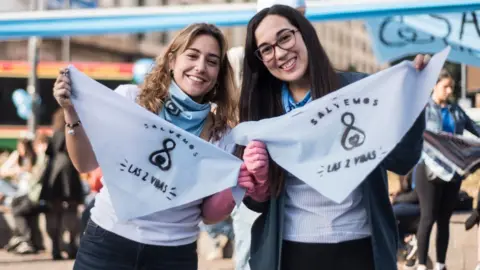 Getty Images
Getty ImagesWe organised "blue marches" [the colour chosen by a conglomerate of groups opposing the bill]: we went out with stickers and banners and we went around the neighbourhoods, knocking on people's doors one by one to foster debate around the bill.
We asked for a referendum similar to the one Ireland had just months ago, but the "green side" refused. Maybe they anticipated that the ballot boxes would reveal that, once you leave the capital, many people in Argentina are against a broad legalisation of abortion.
'Nothing is spontaneous'
Celeste MacDougall is a teacher and activist in the National Campaign for Legal, Safe and Free Abortion.
I have been campaigning for nine years and we have presented a draft for an abortion law seven times: if a bill is not brought to the floor in Congress, after some time it needs to be re-submitted.
We did that seven times.
But while we waited, we also engaged in what we call "social decriminalisation" - that is, we created mechanisms to build social consensus around abortion rights. We worked with health professionals, teachers, universities, cultural agents and artists.
This is an activism that has been building up over decades. Nothing is spontaneous or unexpected.
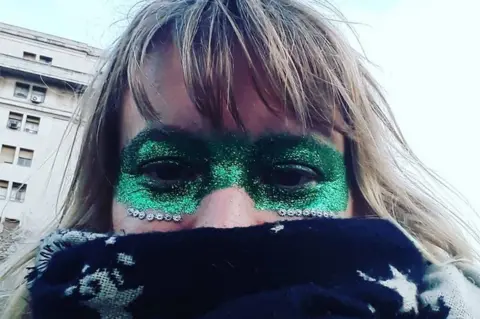 Celeste MacDougall
Celeste MacDougallThe feminist movement in Argentina has been fighting the patriarchal system for over 30 years. Our strength comes from that history, with more than 500 organisations now a part of the national campaign for abortion rights.
We were always out in the streets, in one way or another. We knew society wanted this debate. The issue was out there even though it was missing from our lawmakers' agenda and was invisible to the media - that's something that has now radically changed.
Using music
Clarisa Rodriguez, 43, is studying pedagogy and is an organiser in the anti-abortion group Correntinos por la vida in Corrientes, 1,000km [621miles] north of Buenos Aires.
In Corrientes, where I live, we were silent and disorientated for some time after the bill passed the lower house in June. Then we realised the fight wasn't over.
For us, abortion is murder. We wanted people to understand that though a law may allow it, it doesn't make it alright.
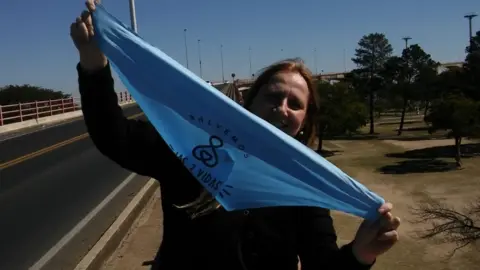 Clarisa Rodriguez
Clarisa RodriguezWe took to the streets to make the "blue wave" visible. We started organising gatherings with percussion music - percussion instruments and carnival are very much rooted in our local culture.
People had to overcome the fear of demonstrating in an environment that has sometimes been very hostile to our views.
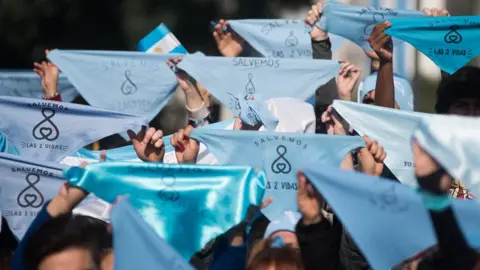 Getty Images
Getty ImagesHousewives, students, doctors and nurses joined, all with the blue neckerchiefs that have become our emblem.
We felt the need to occupy the public space to counterbalance the "green wave" that at one point seemed unstoppable. And it gave us an opportunity to show another kind of feminism, the way we understand it.
Now we are here to stay.


What is 100 Women?
BBC 100 Women names 100 influential and inspirational women around the world every year. We create documentaries, features and interviews about their lives, giving more space for stories that put women at the centre.
